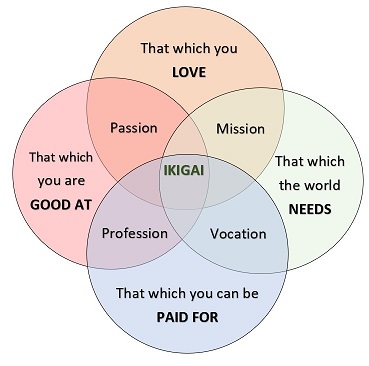THE KEYS TO FINDING YOUR PATH
by Laura Kossoff
The meaning of life is to find your gift.
The purpose of life is to give it away.
~ Pablo Picasso

“Ikigai” is a Japanese concept of being on your path and living your purpose. It focuses on having a life with joy, meaning and motivation.
The following four aspects are often seen as the key elements of ikigai:
- What you love
- What you are good at
- What the world needs
- What you can be paid for

Potential Benefits of Ikigai
Research conducted in Japan showed that those with high levels of ikigai also experienced:
- Greater longevity
- Lower rates of cardiovascular disease
- Improved feelings of happiness and well-being
- Lower levels of stress
- Less anxiety
- Better sleep
Ikigai has two main components: purpose and action.
Purpose
This aspect comes from your heart. It emerges from your authentic self, that which is true for you. I’ve prepared some questions below to help you define (or refine) your purpose.
Action
Once you have a clearer sense of your purpose, your intellect is then needed. Logic comes into play in determining how to pursue your path. I include guidance below.
1. Make a List
To begin the process, please take out a few pieces of paper (or start a new document on your computer). Then, giving yourself some space and time, please answer the following questions:
- What do you enjoy doing?
- What are your greatest interests?
- Favorite hobbies?
- What makes you feel inspired and useful? Energized and motivated?
- What are you good at?
- What are your strongest skills?
- What do others say are your greatest strengths?
- What do you value?
- What is most important to you?
- What issues are powerful and compelling to you?
2. Find the Connections
Now, look over your answers, seeing the overview of your passions, skills, talents and values. Can you find places where they overlap? These can be indications of your purpose.
Once you have a stronger sense of your purpose, the next step is to manifest it in your life.
1. Start small
Change can begin slowly and start with small steps. I believe it is always important to remember that living our ikigai can continue to occur on a small scale, even within our social circle and community. As long as you feel that what you’re doing is making a difference and helping others, you are living your ikigai.
2. Learn more about your areas of interest
- Volunteer at something you love
- Research
- Read about it
- Talk to others who have experience and expertise in the area
3. Remember that ikigai doesn’t have to be paid work
Examples include:
- Tending a garden
- Reading to children
- Cooking and baking for loved ones
- Being a caring and thoughtful friend
Ikigai can change over time
What you valued in your 20s may change in your 40s. Things may shift with new life developments, such as parenthood, retirement and new relationships.
“The Positive Feedback Loop”
Doing what we love is joyful. Sharing it with others brings satisfaction. When we receive positive feedback, we are energized to continue on this path and keep learning and further developing our skills.